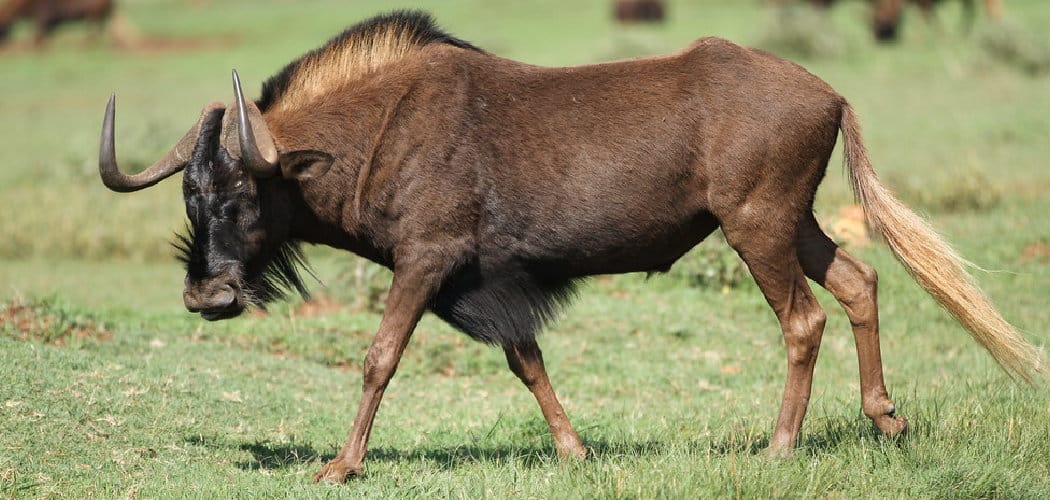When most people think of Africa, they think of lions, elephants, and wildebeests. The wildebeest is one of the most iconic animals in Africa, and it holds a special spiritual meaning for many people. In this blog post, we will explore the wildebeest spiritual meaning and some associated symbolism.
We will also look at how you can connect with this powerful animal spirit to get guidance and help in your life. So, if you are interested in learning more about the spiritual meaning of the wildebeest, keep reading!
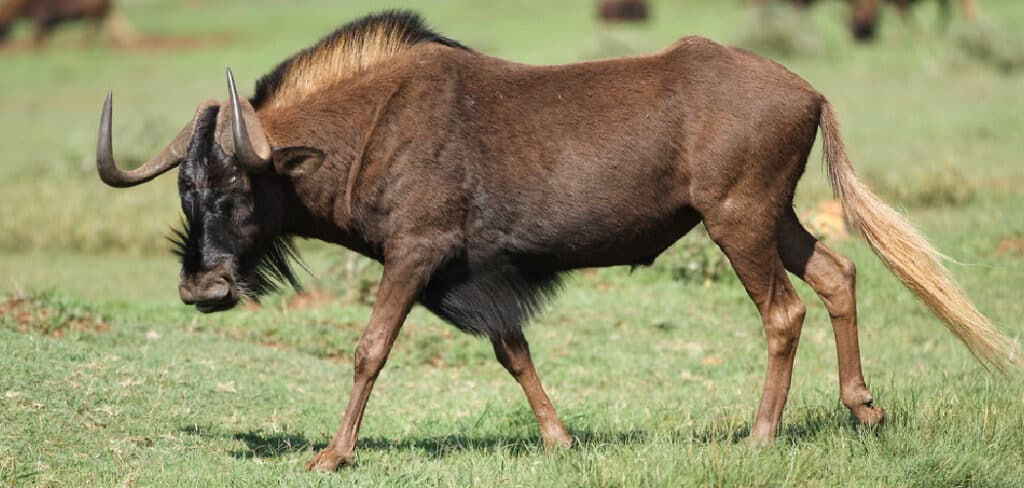
Wildebeest Symbolism and Meaning
Wildebeest Native American Symbolism
The wildebeest is a native American animal that is often associated with strength, endurance, and determination. The word “wildebeest” comes from the Dutch word “wild,” meaning “wild or untamed,” and “beest,” meaning “beast.” In many cultures, the wildebeest is seen as a symbol of power, virility, and ferocity.
The Egyptians believed in the spirit of the god. Set resided in the body of the wildebeest, and they often depicted this animal in their art and mythology. For the Native Americans, the wildebeest was a powerful totem animal representing strength, speed, and stamina.
In some tribes, it was believed that this animal had magical powers and could protect from evil spirits. Today, the wildebeest continues to be an important symbol in many cultures worldwide.
Wildebeest Eastern Symbolism
The Wildebeest is a large-hooved mammal that is found across Africa. Also known as the Gnu, this animal has come to symbolize many things in different cultures. For example, in Eastern African cultures, the Wildebeest is seen as a symbol of strength and virility. This is largely due to the animals’ physical features, which include their large size and horns.
The Wildebeest is also known for its fierce nature, and this trait has led to the creature being seen as a symbol of power and aggression. In some cultures, the Wildebeest is also seen as a representation of the cycle of life. This is because these animals are often involved in mass migrations, during which they travel great distances in search of food and water.
The fact that they are always on the move speaks to the idea of constant change and renewal, which is something that is highly valued in many Eastern cultures. As such, the Wildebeest has become a very important symbolic figure in these societies.
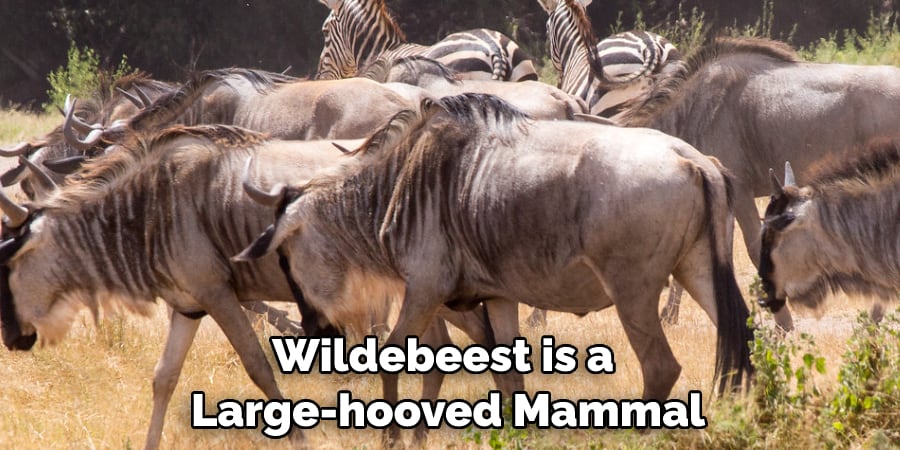
Wildebeest Christianity Symbolism
Christianity has a long history of using animals as symbols to represent various concepts and ideas. One of the most commonly used animals is the wildebeest. Wildebeests are powerful and fast creatures, which makes them ideal symbols of strength and courage.
In addition, their migratory habits have been used to represent life’s journey, and their unique appearance has made them popular symbols of chaos and disorder.
However, wildebeest also have a more positive side, and they have been used to symbolize fertility and new beginnings. As a result, the wildebeest is a powerful symbol that can be interpreted in many different ways.
Wildebeest Celtic Symbolism
The wildebeest is a powerful symbol in Celtic mythology. This mighty creature was said to represent strength, courage, and fertility. In addition, the Celts believed that the wildebeest was a sacred animal that could bring good luck and abundance. In some stories, the wildebeest is even said to have magical powers.
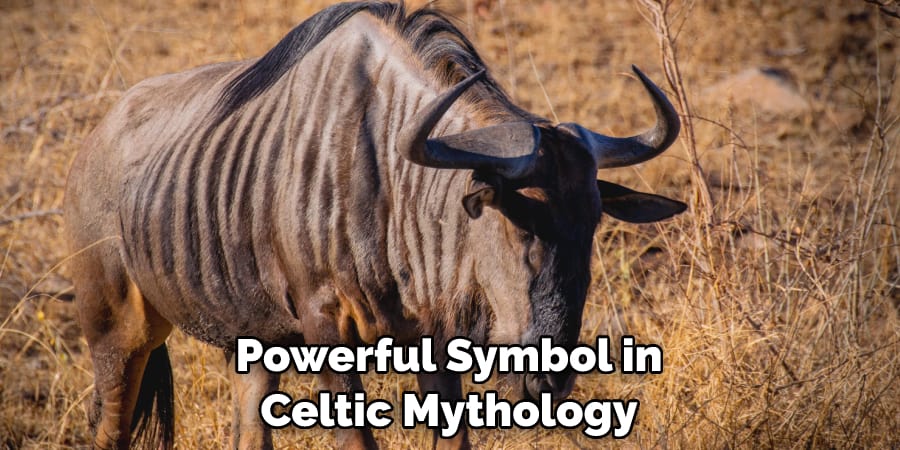
For example, it is said that the sound of a wildebeest’s hooves can ward off evil spirits. The Celts also believed that the wildebeest was a guardian of the underworld. The hero must overcome a wildebeest in many legends to reach the Otherworld. By doing so, he proves his courage and strength and earns the right to enter the land of eternal happiness.
Today, the wildebeest remains an important symbol of Celtic heritage. Many people wear Celtic jewelry adorned with this majestic creature, as it reminds them of their proud Celtic roots.
Wildebeest African Symbolism
The wildebeest is a species of antelope found throughout sub-Saharan Africa. Due to its wide range and abundance, the wildebeest is one of the most iconic African animals. For many people, the wildebeest embodies the spirit of the African continent: strength, stamina, and a never-ending sense of wanderlust.
In addition to its physical prowess, the wildebeest is also known for its social nature. Herds of wildebeest can often be seen grazing together on the plains or migrating en masse across the savanna. This collective behavior is another reason why the wildebeest is considered a symbol of Africa: it represents the continent’s unity and cooperation.
Whether it’s running from predators or migrating in search of food, the wildebeest always does it as part of a group. In this way, the wildebeest reminds us that we are stronger together than we are apart.
You Can Check It Out To Yellowthroat Spiritual Meaning, Symbolism, and Totem
Wildebeest Spiritual Meaning
The wildebeest is a powerful animal that many cultures have long revered. Historically, the wildebeest was seen as a symbol of strength and fortitude, and it was often associated with royalty or nobility. In some cultures, the wildebeest was also seen as a messenger from the spirit world and believed to possess great wisdom.
Today, the wildebeest continues to be respected by many people, and its spiritual meaning is still relevant. The wildebeest reminds us to stay connected to our primal nature and to have faith in our own strength and power. It also reminds us to be open to messages from the spirit world and to listen to our intuition.
By honoring the wildebeest, we can access its power and wisdom and use it to enrich our lives.
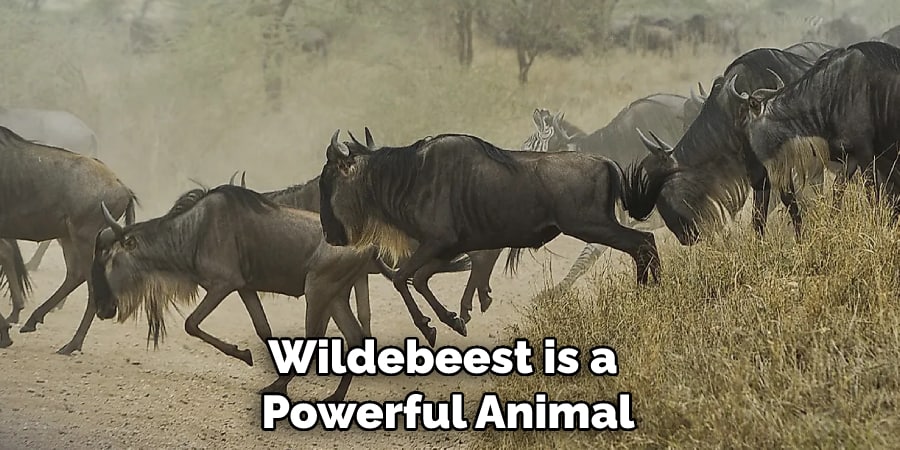
Wildebeest in Dreams
Dreams have been a source of inspiration and mystery since the beginning of time. People from all cultures have sought to interpret the meaning of their dreams, and many believe that they provide a window into the subconscious mind. One of the most commonly recurring dream symbols is the wildebeest.
Wildebeest often appear as herd animals and represents our primal instincts and natural urges. They embody our need for freedom but can also indicate feelings of insecurity or vulnerability. Whether we view them as frightening or fascinating, wildebeest often appears in our dreams when we grapple with powerful emotions or deep-seated issues.
By understanding the symbolism of this dream symbol, we can gain valuable insights into our own psyche.
Wildebeest Encounters and Omens
The wildebeest is a large, imposing creature with a shaggy mane and sharp horns. For many cultures, the wildebeest is also seen as a powerful omen. For example, encountering a wildebeest in Africa is often seen as a sign of good luck, and it is not uncommon for people to keep a wildebeest bone or tooth as a talisman.
In some cultures, the appearance of a wildebeest is even thought to herald the birth of a great leader. The wildebeest is also associated with strength and perseverance. In many traditional stories, the wildebeest is portrayed as an unstoppable force capable of overcoming any obstacle in its path. As such, the wildebeest has become a symbol of determination and resilience, qualities that we can all aspire to.
Wildebeest’s Meaning in Mythology and Folklore
The wildebeest is a large African antelope with a long neck and striking black-and-white markings. Though it is often considered an ugly creature, the wildebeest have been revered in mythology and folklore for centuries. In many African cultures, the wildebeest is seen as a symbol of fertility and virility.
This is likely due to the animal’s high reproduction rate; a single wildebeest cow can give birth to up to six calves in a single year. The wildebeest is also seen as a representation of strength and endurance; its long migration across the Serengeti plains has been called one of the “Seven Wonders of the Animal World.” In both ancient and modern cultures, the wildebeest occupies a place of honor and respect.
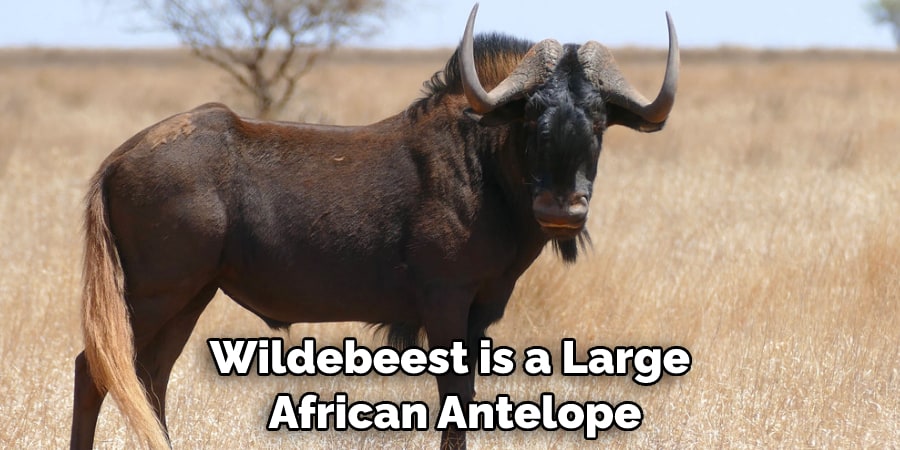
Wildebeest Totem Animal
The Wildebeest is a large and majestic animal that is native to Africa. Also known as the Gnu, this powerful creature is known for its strength and resilience. The Wildebeest is a symbol of determination and survival, as it has been able to adapt to the changing landscape of Africa over the centuries.
The Wildebeest is also a herbivore, which means that it contributes to the ecosystem by providing food for other animals. Consequently, the Wildebeest is an important animal not only in Africa but also around the world. When you see a Wildebeest, please take a moment to appreciate its strength and beauty.
Wildebeest Tattoo Meaning
The Wildebeest is a member of the antelope family and is found throughout Africa. The name Wildebeest comes from the Dutch word for “wild beast” or “wild cow.” The Wildebeest is a very strong and sturdy animal, which is why it is often used as a symbol of strength and endurance. The Wildebeest is also a very social animal, living in large herds.
This makes them a perfect tattoo choice for those who value family, friendship, and community. The Wildebeest is also a reminder that we are all connected and that our actions can have a ripple effect on those around us. So, consider the Wildebeest if you’re looking for a meaningful tattoo with deep symbolism.
Conclusion
The wildebeest is a powerful symbol of transformation, new beginnings, and self-reliance. This magnificent animal embodies the courage and strength needed to overcome adversity and create a new life.
You Can Check It Out to Indian Elephant Spiritual Meaning, Symbolism, and Totem

